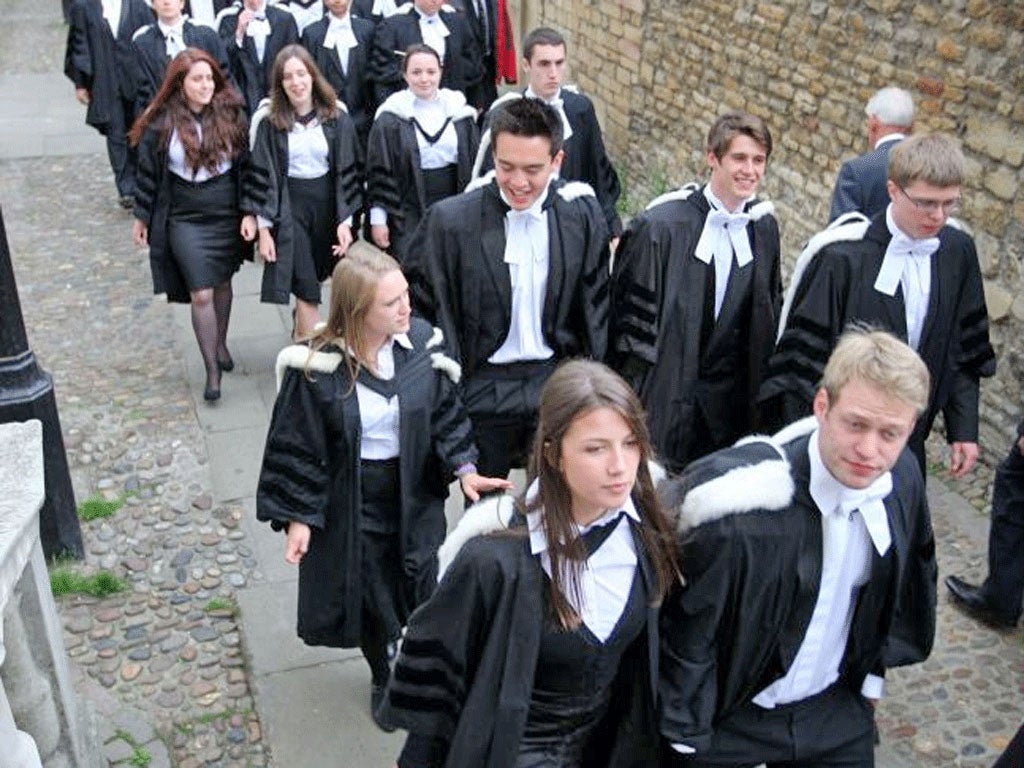Pupils 'not encouraged' to apply to Oxbridge
Teachers' misconceptions may be holding bright students back, claims charity

Your support helps us to tell the story
From reproductive rights to climate change to Big Tech, The Independent is on the ground when the story is developing. Whether it's investigating the financials of Elon Musk's pro-Trump PAC or producing our latest documentary, 'The A Word', which shines a light on the American women fighting for reproductive rights, we know how important it is to parse out the facts from the messaging.
At such a critical moment in US history, we need reporters on the ground. Your donation allows us to keep sending journalists to speak to both sides of the story.
The Independent is trusted by Americans across the entire political spectrum. And unlike many other quality news outlets, we choose not to lock Americans out of our reporting and analysis with paywalls. We believe quality journalism should be available to everyone, paid for by those who can afford it.
Your support makes all the difference.Fewer than half of state secondary schoolteachers encourage even their brightest pupils to apply to Oxford or Cambridge, according to research published today.
A survey by the education charity the Sutton Trust suggests that teachers' own misconceptions could be preventing students from aiming for places at Britain's most highly regarded universities – and that the problem is getting worse.
With fees set to triple to £9,000 in September, elite universities are under pressure to show commitment to widening access. However, only 44 per cent of state secondary school teachers in England said they would encourage their best pupils to apply to Oxbridge, compared with 50 per cent five years ago.
The study suggests that many teachers assume the two institutions admit a greater proportion of private school alumni than is the case in reality, or have little clear idea about admission figures.
When asked what proportion of Oxbridge students were from state schools, 14 per cent said they did not know. Of the remainder only 7 per cent thought it was over 50 per cent and almost two-thirds thought it was less than 30 per cent. The actual figure is 57 per cent – although this does compare poorly with an average of 88 per cent across all universities.
"We need to do much more to dispel the myths in schools about Oxbridge and other leading universities," said Sir Peter Lampl, chairman of the charity, who described the figures as "deeply concerning".
He added: "It is also worrying that almost all state school teachers even the most senior school leaders – think that Oxbridge is dominated by public schools. "The sad consequence of these findings is that Oxford and Cambridge are missing out on talented students in state schools who are already under-represented at these institutions based on their academic achievements."
Head teachers' leaders said last night that the universities must shoulder part of the blame for teachers' misconceptions. Brian Lightman, the general secretary of the association of School and College Leaders, said: "If teachers and for that matter the general public are not aware of admissions trends to Oxbridge, surely those universities should be addressing the misconception in their own communications?"
"We agree that young people should be made aware of the opportunities available to them, which is why we have been so concerned about the removal of national funding for face-to-face careers guidance by a qualified adviser. This should be an entitlement for all students.
"Applying to Oxbridge is only one of many appropriate routes for our brightest young people. There are many good universities in the UK and other excellent employment-based routes into top careers, all of which are available to high calibre applicants from all backgrounds.
"Social mobility is about far more than entry to Oxbridge."
The Russell Group, which represents 24 of the country's leading higher education research institutions – including Oxford and Cambridge – constantly argues that its universities plough millions of pounds every year into outreach work aiming to try and persuade disadvantaged youngsters to apply to their universities.
However, it argues that its work is often hampered by state schools not putting their students in for the right subjects at A-levels to obtain places.
Join our commenting forum
Join thought-provoking conversations, follow other Independent readers and see their replies
Comments